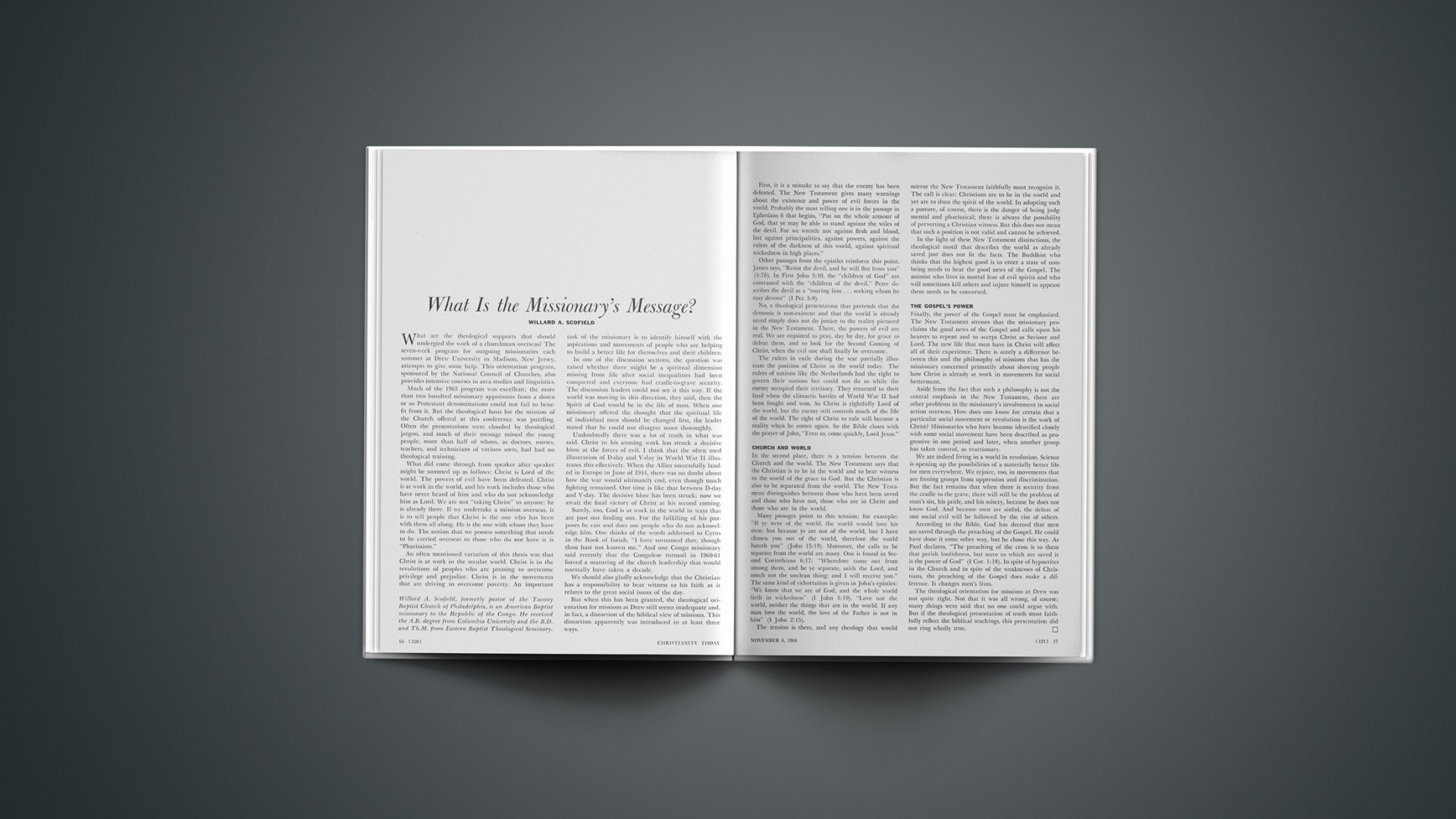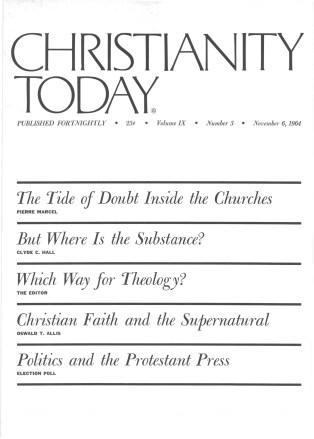What are the theological supports that should undergird the work of a churchman overseas? The seven-week program for outgoing missionaries each summer at Drew University in Madison, New Jersey, attempts to give some help. This orientation program, sponsored by the National Council of Churches, also provides intensive courses in area studies and linguistics.
Much of the 1963 program was excellent; the more than two hundred missionary appointees from a dozen or so Protestant denominations could not fail to benefit from it. But the theological basis for the mission of the Church offered at this conference was puzzling. Often the presentations were clouded by theological jargon, and much of their message missed the young people, more than half of whom, as doctors, nurses, teachers, and technicians of various sorts, had had no theological training.
What did come through from speaker after speaker might be summed up as follows; Christ is Lord of the world. The powers of evil have been defeated. Christ is at work in the world, and his work includes those who have never heard of him and who do not acknowledge him as Lord. We are not “taking Christ” to anyone; he is already there. If we undertake a mission overseas, it is to tell people that Christ is the one who has been with them all along. He is the one with whom they have to do. The notion that we possess something that needs to be carried overseas to those who do not have it is “Pharisaism.”
An often mentioned variation of this thesis was that Christ is at work in the secular world. Christ is in the revolutions of peoples who are pressing to overcome privilege and prejudice. Christ is in the movements that are driving to overcome poverty. An important task of the missionary is to identify himself with the aspirations and movements of people who are helping to build a better life for themselves and their children.
In one of the discussion sections, the question was raised whether there might be a spiritual dimension missing from life after social inequalities had been conquered and everyone had cradle-to-grave security. The discussion leaders could not see it this way. If the world was moving in this direction, they said, then the Spirit of God would be in the life of man. When one missionary offered the thought that the spiritual life of individual men should be changed first, the leader stated that he could not disagree more thoroughly.
Undoubtedly there was a lot of truth in what was said. Christ in his atoning work has struck a decisive blow at the forces of evil. I think that the often used illustration of D-day and V-day in World War II illustrates this effectively. When the Allies successfully landed in Europe in June of 1944, there was no doubt about how the war would ultimately end, even though much fighting remained. Our time is like that between D-day and V-day. The decisive blow has been struck; now we await the final victory of Christ at his second coming.
Surely, too, God is at work in the world in ways that are past our finding out. For the fulfilling of his purposes he can and does use people who do not acknowledge him. One thinks of the words addressed to Cyrus in the Book of Isaiah, “I have surnamed thee, though thou hast not known me.” And one Congo missionary said recently that the Congolese turmoil in 1960–61 forced a maturing of the church leadership that would normally have taken a decade.
We should also gladly acknowledge that the Christian has a responsibility to bear witness to his faith as it relates to the great social issues of the day.
But when this has been granted, the theological orientation for missions at Drew still seems inadequate and, in fact, a distortion of the biblical view of missions. This distortion apparently was introduced in at least three ways.
First, it is a mistake to say that the enemy has been defeated. The New Testament gives many warnings about the existence and power of evil forces in the world. Probably the most telling one is in the passage in Ephesians 6 that begins, “Put on the whole armour of God, that ye may be able to stand against the wiles of the devil. For we wrestle not against flesh and blood, but against principalities, against powers, against the rulers of the darkness of this world, against spiritual wickedness in high places.”
Other passages from the epistles reinforce this point. James says, “Resist the devil, and he will flee from you” (4:7b). In First John 3:10, the “children of God” are contrasted with the “children of the devil.” Peter describes the devil as a “roaring lion … seeking whom he may devour” (1 Pet. 5:8).
No, a theological presentation that pretends that the demonic is non-existent and that the world is already saved simply does not do justice to the reality pictured in the New Testament. There, the powers of evil are real. We are enjoined to pray, day by day, for grace to defeat them, and to look for the Second Coming of Christ, when the evil one shall finally be overcome.
The rulers in exile during the war partially illustrate the position of Christ in the world today. The rulers of nations like the Netherlands had the right to govern their nations but could not do so while the enemy occupied their territory. They returned to their land when the climactic battles of World War II had been fought and won. So Christ is rightfully Lord of the world, but the enemy still controls much of the life of the world. The right of Christ to rule will become a reality when he comes again. So the Bible closes with the prayer of John, “Even so, come quickly, Lord Jesus.”
Church And World
In the second place, there is a tension between the Church and the world. The New Testament says that the Christian is to be in the world and to bear witness to the world of the grace to God. But the Christian is also to be separated from the world. The New Testament distinguishes between those who have been saved and those who have not, those who are in Christ and those who are in the world.
Many passages point to this tension; for example: “If ye were of the world, the world would love his own: but because ye are not of the world, but I have chosen you out of the world, therefore the world hateth you” (John 15:19). Moreover, the calls to be separate from the world are many. One is found in Second Corinthians 6:17: “Wherefore come out from among them, and be ye separate, saith the Lord, and touch not the unclean thing; and I will receive you.” The same kind of exhortation is given in John’s epistles: “We know that we are of God, and the whole world lieth in wickedness” (1 John 5:19). “Love not the world, neither the things that are in the world. If any man love the world, the love of the Father is not in him” (1 John 2:15).
The tension is there, and any theology that would mirror the New Testament faithfully must recognize it. The call is clear: Christians are to be in the world and yet are to shun the spirit of the world. In adopting such a posture, of course, there is the danger of being judgmental and pharisaical; there is always the possibility of perverting a Christian witness. But this does not mean that such a position is not valid and cannot be achieved.
In the light of these New Testament distinctions, the theological motif that describes the world as already saved just does not fit the facts. The Buddhist who thinks that the highest good is to enter a state of non-being needs to hear the good news of the Gospel. The animist who lives in mortal fear of evil spirits and who will sometimes kill others and injure himself to appease them needs to be converted.
The Gospel’S Power
Finally, the power of the Gospel must be emphasized. The New Testament stresses that the missionary proclaims the good news of the Gospel and calls upon his hearers to repent and to accept Christ as Saviour and Lord. The new life that men have in Christ will affect all of their experience. There is surely a difference between this and the philosophy of missions that has the missionary concerned primarily about showing people how Christ is already at work in movements for social betterment.
Aside from the fact that such a philosophy is not the central emphasis in the New Testament, there are other problems in the missionary’s involvement in social action overseas. How does one know for certain that a particular social movement or revolution is the work of Christ? Missionaries who have become identified closely with some social movement have been described as progressive in one period and later, when another group has taken control, as reactionary.
We are indeed living in a world in revolution. Science is opening up the possibilities of a materially better life for men everywhere. We rejoice, too, in movements that are freeing groups from oppression and discrimination. But the fact remains that when there is security from the cradle to the grave, there will still be the problem of man’s sin, his pride, and his misery, because he does not know God. And because men are sinful, the defeat of one social evil will be followed by the rise of others.
According to the Bible, God has decreed that men are saved through the preaching of the Gospel. He could have done it some other way, but he chose this way. As Paul declares, “The preaching of the cross is to them that perish foolishness, but unto us which are saved it is the power of God” (1 Cor. 1:18). In spite of hypocrites in the Church and in spite of the weaknesses of Christians, the preaching of the Gospel does make a difference. It changes men’s lives.
The theological orientation for missions at Drew was not quite right. Not that it was all wrong, of course; many things were said that no one could argue with. But if the theological presentation of truth must faithfully reflect the biblical teachings, this presentation did not ring wholly true.



